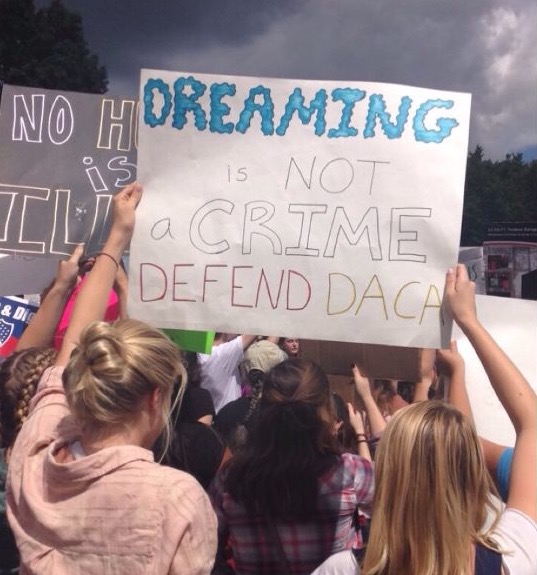Last week, President Trump reneged on a promise and threw the livelihoods of 800,000 young people into jeopardy by announcing that he plans to phase out the Deferred Action for Childhood Arrivals (DACA) program. Those affected are people who moved to the United States with their parents as children and have completed or are working toward high school diplomas. Many have no memory of their lives outside the United States. Some speak only English. All of them are Dreamers.
Last week’s announcement shows that President Trump plans to use their lives as bargaining chips. Desperate for a legislative accomplishment of any kind, Trump has thrown Dreamers back into the lurch from which DACA pulled them. This editorial board sees this as cruelty, plain and simple.
DACA, as President Barack Obama created it by executive order in 2012, allows undocumented young people to apply for protection from deportation proceedings, called a deferral. Obama’s order came after the failed passage of the DREAM Act, a bill which seeks to make similar protections law. Now, those young people can apply for a deferral every two years, so long as they continue to meet the criteria set out in DACA. Among other requirements, applicants to the program must have come to the United States as children under a specific timeline, either be in school or have a high school diploma, and not have been convicted of a serious crime. In addition, Dreamers are often unable to travel for leisure and must apply for permission to travel for other purposes. These rules have allowed hundreds of thousands of U.S. residents the peace of mind that they will not be thrown out of their homes. This peace of mind has been ripped away by President Trump’s latest announcement.
DACA is structured as a program by which the Department of Homeland Security applies prosecutorial discretion to undocumented immigrants. This discretion is an essential part of how the Department operates—it is how immigration authorities decide who to pursue for deportation. In other words, DACA is a promise that the government will let Dreamers remain in the country so long as they stay on the right side of the law and reapply for protection every two years. By ending the program, Trump will go back on the government’s promise and violate the trust that Dreamers placed in our government. Unprotected by DACA, Dreamers could now be at even greater risk of deportation because the government has their personal information. While the Department of Homeland Security is currently not sharing information with ICE, given Trump’s volatility on these issues, there is no assurance that this is a long-term policy.
In the years following President Obama’s creation of the program, critics complained that his executive action skirted the rule of law and overreached his authority. While we applaud Obama’s decision, it is clear that executive action cannot be a permanent solution. The safety and stability of these Dreamers should not be based on the whim of whoever sits in office, subject to change every four or eight years. That Obama’s decision can now so easily be overridden by his successor shows how urgently this country needs comprehensive immigration reform.
To make permanent the protections DACA gave Dreamers, Congress must pass the DREAM Act, which has floated around the House and Senate for some 16 years. As an actual law, not simple executive action, it would be less vulnerable to the impulses of any temperamental president.
In the meantime, organizations across the country can and must take action to support Dreamers and their families. Here at Georgetown, the university’s administration has made clear its support of our undocumented peers. Georgetown now has an associate director for undocumented services who is responsible for helping undocumented students, including Dreamers, with the challenges unique to their status. On Sept. 5, the date of President Trump’s announcement, university President DeGioia reiterated his administration’s pledge to undocumented students by announcing a partnership with Catholic Charities Immigration Legal Services, which will provide free legal counsel to undocumented students. Additionally, the university maintains a webpage dedicated to outlining resources available to undocumented students.
We commend President DeGioia’s statement, and all that the university is doing to support Undocumented Hoyas here on campus. However, such decisions should not fall on a university president, and we call on Congress to enact legislation that sets in stone our dedication to Dreamers. Anything less leaves 800,000 people’s lives hanging in the balance and abdicates our responsibility to protect people who call this country home. Anything less is just cruel.







